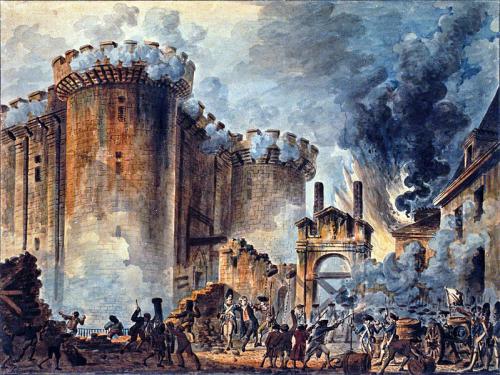You are here
Teach Pathos through Politics -- the French Revolution
Primary tabs

Prise de la Bastille, by Jean-Pierre-Louis-Laurent Houel
This assignment connects the rhetorical concepts pathos and logos with the critique of Enlightenment rationalism by classical conservative philosopher Edmund Burke.
No specific materials required
Begin by reviewing the concepts pathos, logos, and kairos. After this review, provide a brief introduction to Burke's conservative philosophy, making sure to address that his most famous ideas were written in reaction to the French Revolution. Explain that in order for the class to truly understand Burke's philosophy they need to understand a little something about the events of the French Revolution. Today they will do something a little new--they will collaboratively learn history through their own online research. Together they are going to inform themselves, and each other, of the events and social movements Burke found so repugnant.
Instructors should come prepared to discuss Burke's philosophy, his history, as well as the ideas and the basic history surrounding the French Revolution, as well as, a brief timeline of key events.
Organize your students in teams of three or four. Depending on class size, you should end up with four or five teams. Have each team member log-in to their nearest computer terminal. Assign team one the phrase "the Reign of Terror." Assign team two the name "Robespierre." Assign team three the term "Jacobin" (and, if you are feeling adventurous, the term "Girondin" as well). Assign team four the phrase "the Storming of the Bastille." Assign team five the term "guillotine." Give teams seven or eight minutes to research their respective terms online. After this initial period, ask groups to convene and elect a group member to present what they've discovered. Usually each team comes back with unique information but, also, a great many congruencies. Between all the information presented, after roughly ten or fifteen minutes of discussion, an approximate picture of the excesses of the French revolutionaries will begin to take shape.
Now, with the students feeling more ownership over these historical events, proceed to explain how Burke believed Enlightenment rationalism--overestimated the role of logic, or logos, in human decision-making; underplayed the role of emotion, or pathos, in human affairs; entirely misunderstood the time and opportunity costs, or kairos, involved in any rearrangement of culture or political governance. Making these rhetorical connections can sometimes be difficult, and, for this reason, I only suggest tackling this lesson mid semester once your students' understanding of these rhetorical concepts is solid and deeply rooted.
No evaluation necessary.
In order for your students to truly understand how rhetorical concepts relate to Burke's ideas, I suggest pairing this assignment with a short selection from Burke's Reflections on the Revolution in France. I recommend a chapter entitled "Society, Reverence, and the 'True Natural Aristocracy'" and another entitled "Appeal From the New to the Old Whigs."
I use this lesson plan in a 309K course, Rhetoric of Political Belief, whenever I introduce Burke. However, I believe it could be useful to any literary studies or intermediate course with any significant historical or political component.
-

- Log in to post comments

